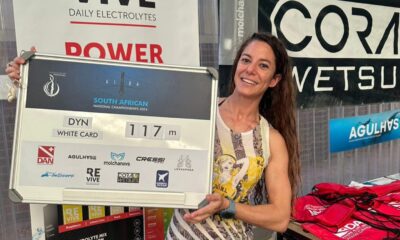
Sport

Sklair dives into first world championship, sets new record
South African freediver Thalia Sklair won the female category overall at the AIDA (International Association for the Development of Apnea) Israel National Pool Championship at the beginning of June, enabling her to represent Israel at the AIDA Freediving World Championship in Kaunas, Lithuania, later in the month.
Sklair, 37, who lives in South Africa, was the only Israeli athlete at the world championship, where she recorded two personal bests and set new Israeli national records in all three disciplines she competed in. This included breaking her own static record set two weeks earlier at the Israeli championship.
Going to Israel and competing in Tel Aviv during the war gave the South African-Israeli some anxiety the night before she left Johannesburg.
Sklair said she felt a sense of fear heading to the AIDA Freediving World Championship in Kaunas, her first world championship, as the only representative of Israel. She set two of those national records by holding her breath while swimming for 150m, and attained the other record by holding her breath for more than six minutes underwater.
“I couldn’t be prouder to do it for Israel,” said Sklair. “There was a lot of pressure, mostly that I put on myself, but after the first dive, support poured in exponentially from across the globe from family, childhood friends, divers I know, and divers I don’t know, saying how they were so proud to see Israel being represented at worlds. It was such an honour. But next time, I really hope to go along with some teammates and do it together.”
That said, this King David Linksfield alumnus wasn’t alone outside of the pool. “To my surprise, Kaunas is full of Israelis. There is, of course ,a strong link to the past there,” she said, referring to the fact that the Jewish presence in Kaunas dates back to at least the 16th century. “But there are also some really good medical schools in Lithuania, so I discovered that many Israelis go there to study medicine. Hearing Hebrew on the streets made me feel relaxed and like I wasn’t alone after all.”
A possible reason why no other athletes represented Israel at the championship may be the costly and time-consuming commitment it takes to get there. “Just the competition entry fee alone is a minimum of €400 [R7 953],” Sklair said, “never mind nine months of coaching; the right nutrition; flights; accommodation; and medical fees if need be. The only reason I was able to take myself to this championship is that I committed to this competition last year while working onboard a vessel where I had minimal living expenses, so I used those savings for this one competition.”
A new world record was set in women’s static apnea at the world championship when Heike Schwerdtner from Germany held her breath for more than nine minutes. “This is huge news in the freediving world, as the last record was set by the late Natalia Molchanova in 2013 and no-one has been able to come close until now,” Sklair said. “I was competing with some of the best athletes in the world.”
Sklair said she performed better at the world championship than in Israel because of the pressure of it being her first world championship, the piece of mind from being told the “safeties” in Kaunus had trained for months, and the support from her coach, Budimir Buda Šobat. He’s an experienced world champion athlete who competed in Lithuania and knows the inner workings of these competitions. “Progress in free diving is very personal, so it’s vital to have someone there who knows where you’re at,” she says.
Coming first at the Israeli national championship in Tel Aviv was a bonus for Sklair. “The real gain was being a part of the development of the sport in the country. I hope this inspires other divers to train apnea and take the sport more seriously,” she said. Her static result of six minutes and nine seconds was a new national record, and ultimately, it’s what won her first place. She ended more than 30 points ahead of second-placed Liat Shalom.
Sklair felt anxious before she left Johannesburg, but she ended up experiencing more anxiety in Johannesburg than in Israel. “Flying into Tel Aviv was quite an emotional experience. All the sadness hit me again, but I was also so happy to be back. Israel will always be home.
“I’ve been staying on Kibbutz Ein Gev in the north, and when Lebanon attacked over Shavuot, we had tremors and blasts from the rockets over a few consecutive days and nights and there were fighter jets flying constantly overhead. It made training all the more focused as you have to stay calm no matter what when you hold your breath. I saw smoke north of the Kinneret where some rockets had landed.”










